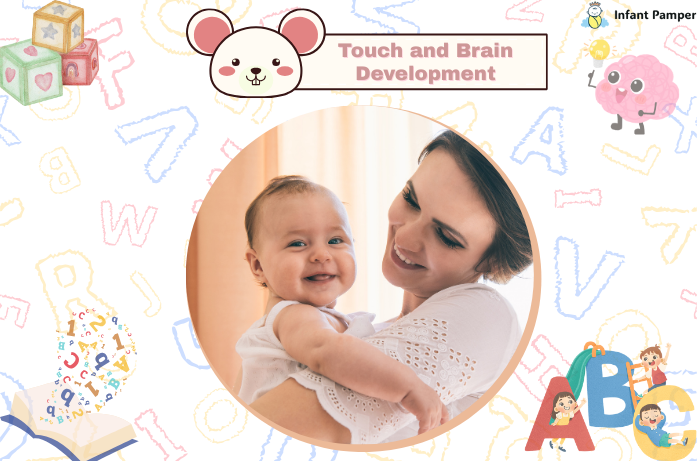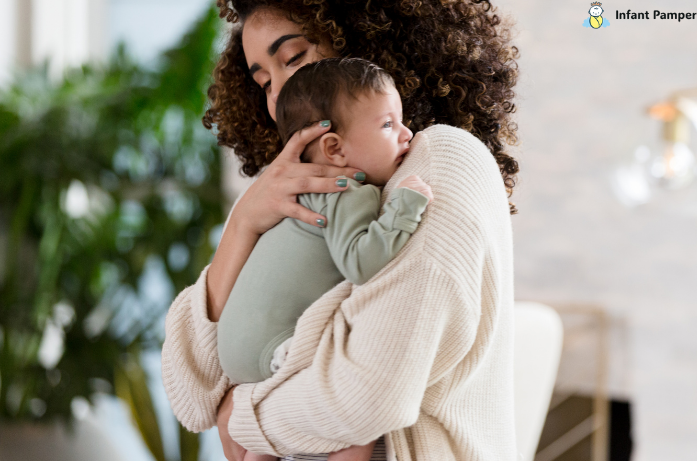Written by a caring mom, for Infant Pamper
Have you ever noticed how tears flow spontaneously when you hold your baby? Or how a gentle back rub can transform a baby from whining to sighing with relief? It’s more than just comfort; it’s connection. Gentle care and touch are one of the most powerful parenting tools we have as parents, and one of the first “languages” our children learn.
Touch from the very moment of birth, through to everyday activities like feeding, playing, and soothing, will affect your baby’s emotional development, brain growth, and sense of safety. More than lulling sounds or overpriced toys, it is the loving touch of your hand and your gentle presence that will build your baby’s confidence to thrive.
We will look into why touch is essential, how it supports the development of the brain and emotions, and simple ways to incorporate it into your everyday routine.
Why Touch Is Your Baby’s First Language
Long before they understand spoken language, babies understand touch. Its importance in plants and animals is extremely ancient. It is one of the earliest senses to develop within the womb, as babies are thought to be responding to touch by 8 weeks of pregnancy.
At birth, babies are overwhelmed by the bright lights, unfamiliar sounds, and new sensations. Your touch is the one constant that is communicating safety to them. Skin-to-skin offers your baby all the best feelings imaginable: cuddling and stroking communicate love without a single word.
What Touch Does in the Early Days:
- Body regulation: The skin-to-skin method stabilizes the heartbeat, temperature, and breathing. According to the PMC article on Skin-to-Skin in the First Hour After Birth, this practice supports thermoregulation, reduces crying, and enhances physiological stability in newborns.
- Blood sugar balance: Touching during the first hour after birth helps regulate blood sugar and reduce stress.
- Promotes feeding: Babies are more efficient feeders when held skin-to-skin.
- Builds trust: Even just a gentle touch across the cheek or tummy tells the baby, “You are safe and I am here for you.”
For a newborn, your embrace is home.

Touch and Brain Development
Interestingly: Touch doesn’t just comfort your baby, it literally builds his brain. Neuroscientists at the National Institutes of Health (NIH) have found that positive physical contact stimulates neural pathways that lay the foundation for emotional regulation, learning, and social skills later in life.
- Boosts emotional regulation: A baby provided constant gentle touch will self-soothe normally earlier and will be able to adapt to stress.
- Memory and learning: Lead to brain chemicals due to physical contact that assist in memory, attention, and early language development.
- Encourages secure attachment: Babies touched with warmth and care become securely attached to their caregivers, growing into their ability to be healthy relationships later on.
Every cuddle, pat, or rocking motion contributes to the architecture of the baby’s growing mind.
The Magical Bonding Effect of Skin-To-Skin
Skin-to-skin is not just for those first few hours in the hospital. The beneficial impacts continue when you hold your baby to your chest while breastfeeding, bottle-feeding, or just resting after a bath. As highlighted by UNICEF Baby Friendly, skin-to-skin contact supports breastfeeding, reduces stress, and strengthens the parent-baby bond.
- Releases oxytocin: Oxytocin is the “love hormone,” which deepens your emotional bond and relieves stress of the parent and child.
- Lowers cortisol: Skin-to-skin lowers stress hormones, easing your baby into being much calmer and feeling very secure.
- Supports bonding for all caregivers: Dads, grandparents, and non-birthing parents can all use skin-to-skin to develop closeness; even ten to fifteen minutes is a huge difference.
Tip: Build a skin-to-skin habit by wrapping your baby in a light blanket and placing them on your chest during storytime or naptime or even after baths.
Baby Massage: Gentle Touch With Lasting Impact
One of the most beautiful ways with which to apply touch is baby massage. It requires no special skills or tools-just your hands, a quiet space, and sensitivity to your baby’s cues.
Benefits of Baby Massage
- Promotes sleep: Babies who get regular massage fall asleep faster and sleep longer.
- Soothing the tummy: Massaging with tender strokes on the tummy relieves colic, gas, and constipation.
- Promoting blood circulation: Massage aids digestion and blood flow.
- Promotes motor skills: Gentle pressure supports babies becoming more aware of their bodies, therefore internally increasing coordination.
- Building their confidence as parents: It enables parents to understand their baby’s cues so they feel more connected and congenial.
The American Academy of Pediatrics and many pediatric experts recommend massage as a safe, bonding activity when done gently and with baby-safe oils.
How to Start a Massage Routine
- Choose a calm and warm space.
- Use natural baby-safe oil (such as coconut or almond oil). Test on a small area first.
- Begin with gentle strokes on arms and legs, then move to tummy and back.
- Speak, hum, or sing softly to maintain a connection through sound and touch.
- If your baby becomes restless or seems uncomfortable, stop.
A few minutes a day is all it takes to build a routine that will truly be rewarding for both of you.
Everyday Touch: Simple Ways to Connect
You don’t have to schedule special time to bond through touch. There are plenty of opportunities in daily life:
- Morning cuddles before diaper changes
- Holding hands during feeding or reading
- Warm hugs after naps
- Gentle back rubs while singing lullabies
- Tickling on tummy during tummy time
All these small moments reassure your baby and build trust. In time, the bond establishes a trust relationship between these early interactions and the child’s exploration of the world.
Signs Your Baby Feels Secure
With your baby, you come to appreciate the small signs indicating that your parenting is working. When babies feel safe through touch, they will often:
- Make more eye contact and smile often.
- Relax their bodies during feeding or playing.
- Become curious and like to explore.
- Coo, babble, and interact more with their caregivers.
These are the earliest signs of confidence and emotional security, laying the foundation for resilience and self-esteem throughout childhood.
Touch for Parents: It Benefits You Too
One of the many things parents tend not to realize is that touch is not only good for babies, it is beneficial for you too. Holding and cuddling, and maybe even giving a massage to your little one can:
- Reduce your stress and anxiety
- Lower blood pressure and heart rate
- Build your self-confidence as a parent.
- Help with postpartum blues by releasing oxytocin.
Parenting is a two-way connect. Just as much as your baby needs your touch, you also heal and relax through it, as well as bond.
Final Thoughts: Love in Every Touch
It’s natural for parents to feel under pressure to perform flawlessly. A warm embrace, a soft hand on your baby’s tummy, or the calming rhythm of rocking them to sleep are frequently the things that matter most.
The touch doesn’t just offer comfort in the present moment; it lays a great foundation for future confidence, resilience, and happiness in the baby. So next time your baby reaches out for you, keep in mind that every gentle touch of yours is carving an emotional landscape that stays with the child forever.
FAQs About Baby and Touch
1. When should I start baby massage?
You can do light massage a few weeks after birth. Always follow your baby’s cues, and stop if the baby sounds fussy or uncomfortable.
2. How long should a massage session last?
For young babies, 5-10 minutes will suffice. As the child grows, you may extend the time if he or she enjoys it.
3. Can dads or grandparents perform baby massage or skin-to-skin?
Absolutely! Touching and bonding are a need for all caregivers. A baby gains closeness from all loving adults in their life.
Disclaimer: This article is meant for informational purposes and is in no way a substitute for medical advice. If you are worried about any aspect of your baby’s health or development, please consult a qualified healthcare provider.
👉 Find out more nurturing tips at Infant Pamper and learn how little moments of love create lifelong confidence in your little-one.




